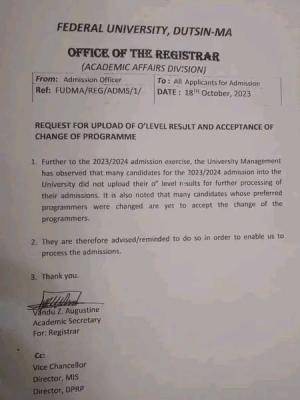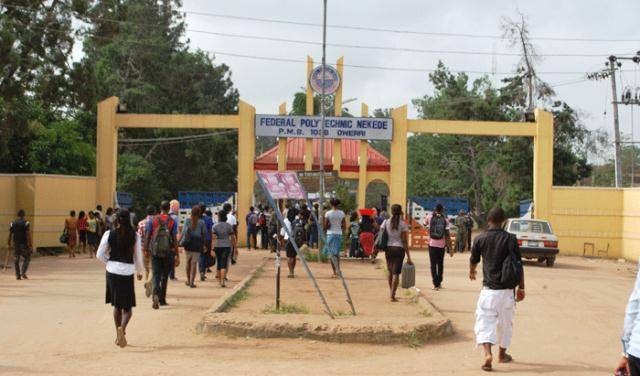
As the number of universities and other tertiary institutions in the country continue to increase, one major issue that has continued to pop up is the problem of inadequacy of faculties at the ivory towers.
Over time, the gap in the student-faculty ratio in the country’s universities has continued to widen, despite the emergence of newer universities.Currently, there are not less than 51 privately owned universities and 78 others including those run by the Federal and some state governments on the list of those recognized by the Nigerian Universities Commission (NUC), with an estimated carrying capacity of about 500,000 students.
Although the private universities have less of the faculty issues to contend with, getting enough of this category of staff has become a major burden on most government owned universities.
The nation’s university landscape is principally manned by holders of second degree holders which a report says accounts for about 57 per cent of the academic workforce nationwide.
Some factors have been attributed to this, including the combination of infrastructural and manpower challenges, lack of facilities, like laboratories and workshop where they would take some test out and do research work. Other reasons adduced by observers are the lack of motivation and explosion in the number of universities and programmes which overstretch the number of PhD holders.
Former Education Minister, Dr. Obiageli Ezekwesili attributed the shortfall to the economic situations in the country.
“When they see that they can do better outside of the country or they think they can do better inside of the country but not within the education sector they would go for the alternative. People have the freedom to choose which incentive is good for them,” she said.
In his view, the former National President of the Academic Staff Union of Universities (ASUU) and Vice Chancellor, Imo State University, Professor Ukachukwu Awuzie, said the situation got to this bad state because so many universities are coming up at a very fast rate at a period the country grossly lacks comprehensive staff development plan.
He said recently, the Federal Ministry of Education launched a programme on how to produce certain number of PhD every year but because of lack of funding and inadequacy of infrastructure and facilities, noting that the target was not easily accomplished.
“For you to produce PhD, you must have the necessary equipment and laboratories where they can be trained and you must also have good workshop where they would take some test out, research and for that type of research to take place, you must have the facilities, you must have the funding you also needed to have also the manpower”.
According to Dr. Tunde Akanni, a lecturer at the Lagos State University (LASU), the target failed because there was no motivation coupled with lack of information.
“There is no motivation, a columnist once wrote that ‘Nigeria can defeat you’, so Nigeria keeps defeating those who are to teach in the university without a PhD. I am an example. I am hoping to round up my PhD before the end of the year, but I should have gotten my PhD years back due to a number of factors. I did not make up my mind earlier to go into the academia. I was into journalism, but when I decided to go into academics, LASU was so grossly understaffed there was no semester that I taught fewer than six courses. So, how could I have had time to do other things?” he queried.
He lamented that the Tertiary Education Trust Fund (TETfund) that was to make funds available to all aspiring PhD candidates of the academia failed to properly disseminate information to the right quarters.
According to him, “Not many people heard of the opportunity and information. As I am talking to you, not a single LASU lecturer has benefited from the TETfund support for PhD scholars. That is where the problem lies”.
Speaking further, he lamented on the several distractions facing full time academics pursuing a PhD, noting that such might take some to realize because many institution lack the facilities and infrastructures to undertake a PhD programme for aspiring candidates.
“For instance, how many PhD candidates does an average Nigerian university turn out yearly? There are universities as I am talking to you where lecturers do not have access to electronic library and the internet. Remember PhD is essentially a research program. If you want to take it on a part time and shuttle between your work place and where you are enrolled as a student, if your work place lacks facilities to access electronic library, it simply means that your research will always be dependent on obsolete literature's.
“This is another big challenge, unlike in the advanced world where all the materials you need for your research are available electronically so you don’t need to over labour yourself to gain access. The situation in this country is that an average researcher in this country lacks access to information, up to date data, and lack of access to adequate information. There is tendency for a candidate in this helpless situation to abandon the programme,” he added.
Acknowledging that there were a proportion of requisite faculties in the mid 1980s, Vice Chancellor, Caleb University, Professor Ayodeji Olukoju however added that there was never a time when all lecturers in Nigerian universities were holders of the PhD degrees.
He said the reversal of standards could be attributed largely to the exodus of lecturers through brain drain to foreign countries and, to a lesser extent, to the private sector in Nigeria from the mid-1980s,
Advancing reasons for the current situation at the Ivory Tower, Olukoju said; “poor funding of education generally (and tertiary education in particular), the obscurantism of Nigeria’s military (and, even, civilian) rulers, low morale of lecturers, the struggle to augment meager wages through moonlighting, which distracted lecturers from research and postgraduate supervision, the decay of the ambiance and infrastructure for postgraduate studies, and the explosion in the number of universities and programmes that overstretched the number of PhD holders”.
Noting that the solution can only be systematic and strategic, he remarked that there must be deliberate development of centres of excellence in selected Nigerian universities that should be saddled with producing PhDs of the highest quality.
He said for some years now, the National Universities Commission (NUC) has been selecting and celebrating the best PhD thesis produced in Nigerian universities, stressing that this is a clear indication that our universities are among the best in producing PhD holders in particular disciplines.
“All that is required is to strengthen staffing and funding in such departments and institutions. Care must be taken so that such interventions in funding, capacity building and material support are not diverted or hijacked by the central university authority or faculty but made to reach the intended target,” he said.
He further noted that there should be systematic linkages horizontally and vertically on the one hand, that Nigerian universities should be encouraged to partner one another in exchanging expertise and resources toward producing PhD holders, while, on the other, postgraduate training leading to the award of the PhD degree should be factored into partnership agreements with reputable foreign universities.
He also said there should be a reward system that encourages diligent supervision coupled with a quality assurance to forestall mass production of sub-standard PhD theses that joint supervision across disciplines, adding that rigorous vetting through PhD seminars and defense of thesis titles, and a credible external examination system will ensure high quality.
“However, while we aim at producing more PhDs, it is not possible to run a system without non-PhD holders. This is because the university mentor-ship system expects non-PhD holders to learn under senior academics while still working to earn their degrees. This is an essential feature of academic culture that inculcates discipline, diligence and service,”
In his own view, Professor Jide Osuntokun noted that what is needed to be done is to recruit all First Class and all Second Class Upper degree holders, remake the position of graduate assistant the pillar of the system.
“If they are used as graduate assistants, by the time they spend four to five years in the system, they should be ready to get PhD. That is the only way to do it”, he stressed.
He argued that abroad, every university department has budget for graduate assistance, “that is the only way to do it and make that position attractive because if it is not attractive they will go to the industry and leave the university system. Being a university teacher is not easy so you have to make the entry point attractive so that young people can find career in university teaching,” he added.
Also Ezekwesili said the important thing is for the country to bring back an incentive culture, “that is not just about improving the salary of lecturers in the universities but also in terms of bringing prestige and dignity to the work of a lecturer particularly in terms of research.
She said; “Research is the heart of being an academic. Less emphasis was been paid into it. Many of these lecturers do not have the kind of opportunities that their counterparts have abroad”.
Awuzie in his own view said with the intervention of TETfund and some of other agencies that problem can be addressed gradually.
Akanni also said that universities must be willing to give all necessary support to their staff aspiring to do PhD particularly financial support adding that TETfund should deal more directly with ASUU than the management of the universities.




